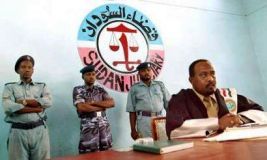Government committee identifies suspects in human rights abuses
KHARTOUM, Sudan, Feb 9, 2005 (AP) — A former Sudanese chief justice said Wednesday his committee on Darfur has identified suspects who should be investigated and perhaps tried for human rights abuses that violated international law.

|
|
A special judge, sits in court in Nyala Sept 30, 2004 to try six Sudanese men accused of belonging to the Janjaweed, who killed 24 people in the southern Darfur region in Oct 2003.(Reuters). |
Chief Justice Dafaalla Al Hajj Yusuf, at a news conference called to discuss a report on Darfur he submitted to the president last month, insisted Sudan was capable of trying the suspects itself. He charged bias was evident in a report by a U.N. commission that has recommended Darfur suspects be brought before the International Criminal Court, the world’s first permanent war crimes tribunal.
Sudan’s vice president had said last week that his government will not send Sudanese citizens or officials suspected of committing war crimes in Darfur to any international court.
After years of tribal clashes over scarce resources in Darfur, conflict erupted in earnest in February 2003 when rebels in the western region took up arms against what they saw as years of state neglect and discrimination against Sudanese of African origin.
The government is accused of responding with a counterinsurgency campaign in which Arab militia known as Janjaweed committed wide-scale abuses against the African population.
Yusuf said his committee had investigated reports of extra-judicial killings in Darfur and “it became clear to us that there was indication that violations took place and, if such is the case, they constitute a violation of…international laws.”
He said the names of suspects had been passed on to another committee recently formed at his recommendation to investigate, interview witnesses and advise whether trials should be held. He did not name suspects or elaborate on the accusations against them.
Yusuf claimed criminal courts here already had sentenced more than 80 people to death in crimes linked to the unrest in Darfur.
He said his committee also had recommended committees be formed to decide how to compensate victims and how to address the underlying causes of the Darfur conflict – chief among them lack of resources in the region.
In a report last week, the U.N. commission concluded that the Sudanese government and militias carried out mass killing and probably war crimes in Darfur.
The U.N. panel said government leaders did not appear to intend to exterminate an entire group for ethnic, religious or other reasons – the definition of genocide, which the U.S. and others say has occurred in Darfur.
However, the panel did not rule out that a court could eventually find there may have been genocidal acts in Darfur and some individuals may be found guilty of genocidal intent.
Yusuf said there were points of agreement between the U.N. committee and his committee of Sudanese judges and experts who spent two months in Darfur late last year,
“The U.N. commission agreed with us that there was no genocide in Darfur,” he said. “It agreed with us that there were rapes and sexual violence, but they charged that it was systematic and intentional and we say this was not the case.”
Yusuf’s committee issued a summary of its report when it was submitted to the president, but the full report has not yet been made public.
